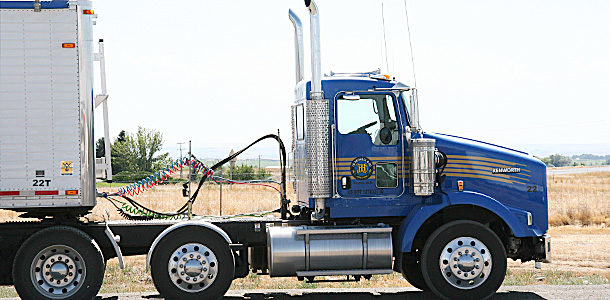Keeping the air brake system functional in very cold and wet conditions is one of the challenges of trucking in the winter. Let me see if I can help you understand the functions involved, and give you an idea or two to help you keep moving.
When the trailer is disconnected from the tractor, there are two air lines that are disconnected. One is the charge or emergency line. It will have air pressure at all times. That air's function is to keep live air to the trailer system and provide the air to release the emergency parking brakes on the trailer.
If this line is broken, the spring-powered brakes on the trailer axles will set, stopping the wheels on the trailer from turning. This line also fills the air reservoir tanks on the trailer. It is the air from these tanks that operate the service brakes on the trailer.
The other line is the service line. When the tractor brakes are applied this line carries air to the trailer control valve (located near the axles on the trailer). Depending on the amount of air sent, which correlates with how hard the driver is applying the brakes, the valve then sends air to apply the trailer brakes from the trailer reservoir.
When the trailer is disconnected from the tractor, a valve on the dash of the tractor is pulled out (usually, older tractor protection valves were a toggle) to turn off the total flow of air to the trailer. This shuts off both the live air to the emergency line and the "on application" air in the service line.
If with both lines disconnected there is air flowing from the service line on brake application, the tractor protection valve would be the first guess as the one that is not working. That is the valve on the dash that you push to charge the trailer brakes when you hook up the trailer.
It is possible that the emergency line has been blocked for some reason at some place on the tractor. The tractor protection valve (so named because its function is to turn off all air to the trailer if a line breaks) leaves air in the system for the brakes on the tractor to function.
With any rapid discharge of air from the emergency line, as if the line was broken or the trailer lost from the tractor, it will pop by itself – turning off all air to the trailer.
It will not manually reset and provide air for normal trailer brake operation without adequate reservoir air in the system. It is not probable that this has happened because that would leave the trailer without air to release the parking/emergency brakes.
It is possible if symptoms mentioned occurred after unhooking a trailer that had been hooked to a parked tractor for several hours in sub-freezing weather.
You can rule this out by pushing the tractor protection valve in (the one that you push in to charge the trailer brakes when you hook up to a trailer), and you should have a large high-pressure flow of air from the emergency brake line.
Some tractors have a storage dock for the air lines to be anchored to when the tractor is operating without a trailer. Some of these may be of high enough quality to prevent the loss of air when the lines are docked.
If this is the case, a novice driver may be operating the bobtail (tractor by itself, with no trailer attached) tractor with the trailer air lines charged. If the emergency line is thus connected, which would block leakage of air from it, and the service line is not blocked, then the service line would flow air when the tractor air brakes were applied.
Very import to remember: Even if both lines are docked and not leaking air it is not safe to operate the tractor bobtail with the trailer brake system charged.
This is because the flow of air to the tractor's service brakes is different when attached to a trailer and when solo. The valve function and/or computer will make this change.
For air brakes to operate in a safe manner, the trailer brakes should apply a fraction of a second before the tractor brakes apply to prevent a jack-knife accident of the tractor and trailer.
This is why the tractor protection valve needs to turn off trailer air supply to the trailer lines when the tractor is to be operated solo.
During cold weather, it is likely that moisture inside the air brakes system has frozen somewhere, rendering all or part of the system inoperable.
The easiest cure is to bring the truck into a warm shop and wait for an hour or two. If warmth corrects the problem then the tractor's air dryer should be repaired, as it should keep water vapor out of the air brake system. Air line dryer, usually alcohol based, should be added to the system to correct for moisture already in the system.
In extreme sub-freezing temperatures it is a good idea to add some air line dryer to the trailer air lines when hooking up to a trailer, especially a trailer someone else has been pulling. Then, of course, observe that the trailer axle brakes really do release and let the trailer wheels turn when you move the trailer.
After this tutorial, the short answer to the original question would be: The tractor protection valve on the dash or the foot valve under the brake pedal or a frozen air line on the emergency circuit. FG
Brad Nelson is certified in brake maintenance by Carlisle Motion Control Industries Inc.
PHOTO
Photo courtesy of William Paul.











